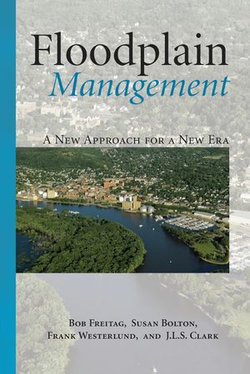Floodplain Management presents a compelling case for rethinking how we live with rivers in an era of rising flood risk. With flood damage in the U.S. now exceeding six billion dollars annually—and climate change expected to worsen the threat—this book offers practical, science-based strategies to reduce risk while working with, rather than against, natural river systems.
The authors argue that the most effective time to manage a flood is before it happens. Instead of relying solely on levees, dams, and other high-cost infrastructure, they outline a new paradigm that prioritizes long-term resilience and cost-efficiency. This approach blends ecological understanding with planning, policy, and design—encouraging communities to retreat from the most vulnerable zones, accommodate floodwaters through smart building practices, and protect vital assets using nonstructural or nature-based solutions whenever possible.
Drawing from current research in hydrology, river ecology, and climate science, Floodplain Management critiques outdated practices while offering clear alternatives that reflect how rivers truly function. The book gives readers a toolkit for anticipating flood behavior, minimizing damage, and making informed decisions about land use and development.
Ideal for planners, engineers, emergency managers, and policymakers, this is a timely and essential resource for adapting to a future where floods are not rare events—but expected challenges we can prepare for wisely.



Share This eBook: